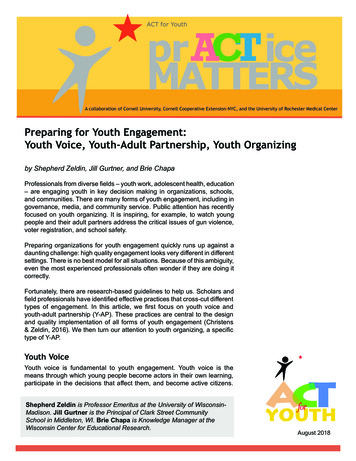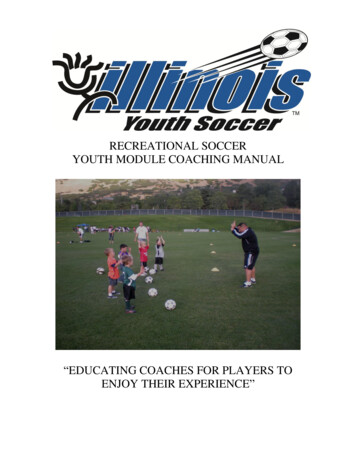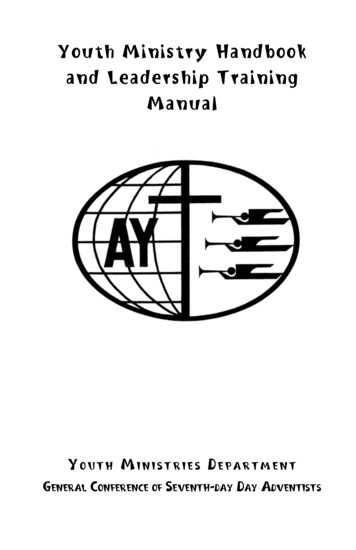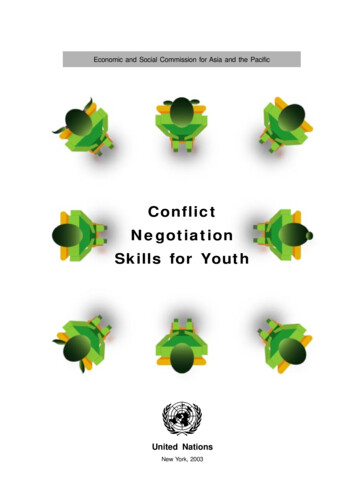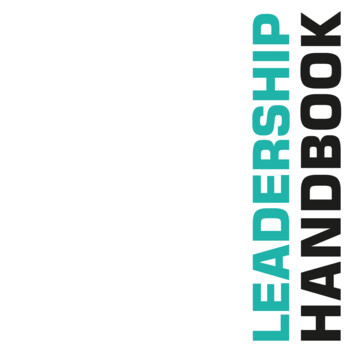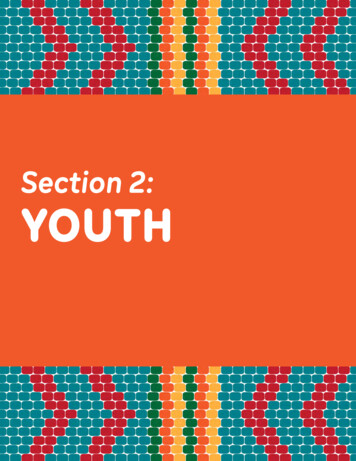
Transcription
Section 2:YOUTH
TABLE OF CONTENTSYouth — You are not alone, You are in this world for a reason, You are your bestadvocateYouth Perspectives and Stories . 4Traditional perspectives on gender: Native traditions and role models . 9Sharing your identity with family members/friends/schools . 11Interacting with health providers and primary care . 20Roadmap for Transition . 22Transition Fast Facts . 31Mindfulness and Meditation . 32Your Sexual Health . 34Your Community . 35Website Resources . 38Crisis Hotlines . 39
YOU ARE NOT ALONE.YOU ARE IN THIS WORLD FOR A REASON.YOU ARE YOUR BEST ADVOCATE.Each person’sexperience is uniqueand beautiful.The advice and information in this Toolkit maynot always apply to your life, your relatives, andyour community. Follow your intuition as youread through this material, just as you trustyourself throughout your gender-affirmingjourney.Before we get started:If you or a friend needs any mental health support or is having a mental health crisis and/or suicidal thoughts, the following resources are available. They are all LGBTQ2S friendly!TRANS LIFELINE: 877-565-8860Crisis line staffed by transgender folks, for transgender folks; toll-freeTHE TREVOR PROJECT: 866-488-7386Crisis intervention and suicide prevention available 24/7 from counselors trained insupporting LGBTQ youthCRISIS TEXT LINE: text HOME to 741741Text at any time to start texting with a crisis counselorYOUTH3
YOU ARE NOT ALONE: Youth Perspectives and Stories“I trust that myancestors wouldstill call me magic.”Arielle TwistTwo-Spirit writer and sex educatorfrom George Gordon First Nation,Saskatchewan“I feel like I am really partof the circle, like I belong tosomething bigger things seemedto make sense once I found theTwo-Spirit community. It wasand is healing. Two-Spirit ishealing.”Dr. Alexandria WilsonTwo-Spirit professor from OpaskwayakCree NationYOUTH4
YOU ARE NOT ALONE: Youth Perspectives and StoriesDuring the creation of this Toolkit, we had the opportunity to speak with a young person whowas excited to share their gender journey. Some aspects of their story, including their name,have been changed to keep their identity anonymous. We do not claim to own their experienceor mean to trivialize their rich journey. Instead, we hope to share their story so that you can readthrough it and gain support and comfort through a peer’s lived experience.Joey’s StoryJoey grew up on a reservation in the Pacific Northwest. Early on in hisgender-affirming journey, Joey isolated himself and hid his genderidentity because on the reservation, “you’re kind of family witheveryone.” He was worried about how people might react to hisnew identity as transmasculine and wasn’t sure whom to tell first.Once he found the words to describe his identity and was ableto say them to himself, it took Joey about one year to share hisidentity with others. He first began to socially transition at schoolwith friends because that was the most comfortable. Once Joeybecame more confident and certain of his identity,he slowly shared his identity with his teachersand other friends. Over time he felt better about telling his parents“Everyone I’veand relatives, and so he was able to share his identity with them.known that“Everyone I’ve known that I’ve told still love me. They still respectI’ve told still love me.me. That’s never changed.”They still respect me.That’s neverFinding a therapist really helped Joey along his journey. “If you canchanged.”get a therapist, I definitely encourage youto do that. Do not just settle. Find a“Talk totherapist for you. If you do have to settle,them as often as youmake sure your therapist understands you. And if you can’tcan, even if it’s just littleget a therapist, I would talk to a school counselor.”conversations or if you sawsomething that was absolutely Great friends helped along Joey’s journey too. “Talkridiculous but made you laugh to them as often as you can, even if it’s just littlethey can help you get through conversations or if you saw something that was absolutelyyour current toughridiculous but made you laugh they can help you getsituation.”through your current tough situation.”YOUTH5
YOU ARE NOT ALONE: Youth Perspectives and StoriesIt took Joey a long time to realize that all of these people were always therefor him. He encourages others to find those supports and to trust in them.Joey also shared how his culture and traditions are related to his identity.“Being Native“Being Native is a really big part of who I am.” Growing up, Joey regularlyis a really bigparticipated in Pow Wows and ceremonies that separated boys and girls.part ofThese events contributed to how he now understands himself and hiswho I am.”role in his community.Throughout his journey, Joey also found it helpful to reach out to communityand tribal members. Joey hasn’t yet been able to find any information recorded in his triballanguage related to Two-Spirit people. Even so, he has been able to talk with his elders andcommunity members about traditional perspectives related to gender. He has found even moreloving support through this process.There were definitely moments when Joey felt unsure, alone, and upset. These feelings wereespecially present during the time he was keeping his identity to himself. In those moments, toget through the tough times, he kept thinking about the little things that he enjoyed. He thoughtabout what he would miss out on if he left or tried to change who he was.Today, Joey attends college at a tribal affiliated university, and is passionate about helpingothers. He is a great example of the great things that can happen when you trust yourselfand love yourself along your gender-affirming journey.YOUTH6
YOUTH7
YOUTH8
YOU ARE NOT ALONE: Native traditions and role modelsDo my ancestorscelebrate me?YES!Native traditions havehonored Two-Spiritand gender nonconforming relatives fortheir commitment toserving the community!“My worldview is the earth. It’s the sky. It’s the animals.It’s trees. It’s the elements of the world, of the earth andwhy they come to us and what we learn from them.”– Two-Spirit First Nations memberEveryone has a unique journey towards gender acceptanceand affirmation. An important part of this journey isembracing your true self. Think about who you are and whyyou love yourself so you can share this with others. ManyTwo-Spirit and transgender individuals feel that this leads to“coming in” rather than “coming out” as a new individual. Beyourself and embrace your journey, rather than trying to fitinto a per-existing identity or label.“We become self-actualized when we become whatwe’ve always been They are just being, that is the waythe Great Mystery made them. They come out in to thisworld like that. And they are living their lives ”– Two-Spirit individualBy embracing who you were meant to be, you can fillimportant roles in your community as an empoweredtransgender or Two-Spirit individual. You can share your giftswith others and make your ancestors and community proud.How could your ancestors not celebrate you?YOUTH9
YOU ARE NOT ALONE: Native Traditions and Role ModelsWho can I lookup to?Your identity iscomplex and developsover time.Reading stories andlistening to experiencesof Native transgenderand Two-Spiritactivists from differentnations may helpyou find inspirationin reclaiming andembracing your ownidentity. Talking withyour tribal elders,relatives, and othertransgender or TwoSpirit people throughonline support groupsor talking circles canalso be helpful.These interactions draw upon your strengths and thestrengths of your ancestors to build your confidence andself-esteem. They can also help you better understand theunique resilience found among AI/AN communities, especiallyamong transgender and Two-Spirit individuals.The following Indigenous individuals identify as LGBTQ2S.Their stories, experiences, & dreams are healing medicine. Geo Neptune(Passamaquoddy), artistSusan Allen (Lakota),politicianChrystos (Menominee), poet,artist, & activistBeth Brant (Mohawk), writer& activistQwo-Li Driskill (Cherokee),writer & educatorFelipe Rose (Lakota),musician & performerShawnee Talbot (Mohawk, SixNations Grande River), singerJack Jackson (Navajo),SenatorTrudie Jackson (Navajo),transgender advocate Howie Echo-Hawk(Pawnee), comedianSharice Davis (Ho-Chunk),1st Lesbian Native Americanin CongressTravis Goldtooth “BuffaloBarbie” (Dine, Navajo)Raven Heavy Runner(Pikunii Blackfeet), TwoSpirit advocate & socialworkerHiram Calf Looking (PikuniiBlackfeet), Two-Spiritadvocate, community &family educatorCree physician Dr. Makokis could be another greatrole model for you to look up to. Dr. Makokis isTwo-Spirit and cares for transgender patients!Learn more about Dr. Makokis in this video.Read an article about Dr. Makokis here.Reminder: All URLs and references for resources in this Toolkit can be found on page 38.YOUTH10
YOU ARE NOT ALONE: Common questions about sharingyour identity with relatives, friends, and school?Hello there! This is a great question!I am transgender andIt is so great you are ready to share your genderwant to tell my friends andidentity with your friends and family. You are sofamily, but I am not sure how to. Ibrave! How and when you share your identityhave felt like this for a while now, but is unique to your special journey—it dependson your comfort, readiness, and safety in yourI am finally feeling ready to shareenvironment. Taking things step by step andmy identity with others. Whatremembering to stay true to yourself will helpyou share your identity with others! This is whoshould I do to prepare myself?you were meant to be!The first thing you may want to think about iswho you will tell first. Sometimes it can be easier tostart sharing your identity with the people you know willsupport you no matter what. These may be your relatives, friends,team members, teachers, doctors, or religious or spiritual leaders. Sometimes the people whoare closest to you (like your parents or siblings) are actually the hardest to tell, and that’s okaytoo. Once you decide who you want to tell, you can start thinking about how you will tell them.There are a number of ways you can do this, and the choice is entirely yours. You can talk on thephone, send an e-mail, write a story, talk face to face the list goes on and on. There is no rightor wrong way to tell someone!If you choose to call someone on the phone or talk face to face, it might help to practice yourconversation and think through what you will say. You might also want to think about how peoplemay react, and how you will respond to them. Thinking through this can help you feel moreconfident before the discussion.Timing and location are also important to think about when talking with your relatives. Issomewhere private better than around a lot of people? Does a weekend or weekday work better?What about during a ceremony or special event?Next, prepare yourself for the range of reactions people may have. You should think abouthaving a safety plan in place just in case your family takes some time to come around to what youshare with them. This may mean planning to stay at a friend or auntie or uncle’s home for a fewYOUTH11
YOU ARE NOT ALONE: Common Questionsdays. You might also want to think about your options for food, school, and transportation.What if someone responds negatively or gets upset? A lot of times, negative reactions are notrelated to you or how someone feels about you. A person may respond negatively because theyfeel surprised and may not know what to say. While you have been living with your feelings andidentity for your entire life, the person you are telling is most likely learning something completelynew about you. They may take some time to process and fully understand what you are sharingwith them. They still love you and want the best for you but may need time to find the words toshare these feelings with you. While you are waiting, try to find support from the other friends ormentors you thought about earlier.One last piece of advice is to think about connecting to traditional knowledge when sharingyour identity. Drawing on the strength of your ancestors might increase your self-confidence.Talking about tradition and ceremony can also help your family remember how ancestors havecelebrated transgender and Two-Spirit people throughout time.Remember to trust yourself no matter what and know that wherever you are on your journeyit is yours to control. Embrace your identity and celebrate how far you have come along yourjourney! You are in this world for a reason!Think about who you would like to tell first at school. Haveyou told anyone already? If you have already sharedyour identity with your parents or relatives, tellingyour friends might be a little easier since you havesome practice. If you haven’t told anyone yet, thinkabout one person at school who you would feelcomfortable telling today.I want to sharemy gender identitywith my classmatesand teachers at school.Do you have anyadvice for me?Telling this one person can help you buildconfidence and trust in the people who love andsupport you. This person can be a great start to yoursupport system both in and out of school. Some ideasinclude a best friend, teacher, coach, or counselor who canhelp you through the journey and remind you of how great youare.YOUTH12
YOU ARE NOT ALONE: Common QuestionsThere is no rush to tell your entire school right away. Over time, the more people you tell, theeasier it will be to talk about.It is also okay if you don’t want to label yourself as a specific identity or with a specific term.This is your choice! If you do choose a label, think about how you’ll explain it to your friends. Ifyou identify as Two-Spirit for example, there may be individuals both within and outside of theNative community who do not fully understand what Two-Spirit means.If you are worried about your safety at school, there are laws to protect every student. One lawis called Title IX and is part of the Civil Rights Act. It helps ensure that each student is treatedfairly and has an equal opportunity to learn. This law also protects from discrimination based onsex and gender. Many other regulations are state specific and can be found online. A great placeto start learning more about your rights is the National Center for Transgender Equality. Thissite also provides tips on how to talk to your school leadership and report violations.You can also find support and advice on how to navigate school and relationships throughschool-based LGBTQ2S groups. Many schools have created LGBTQ2S groups to provide safespaces on campus. There is no pressure to join, but these groups can help you identify peoplewith similar experiences and interests. You can hear their stories and help support one another.If your school does not have an existing group, you may want to think about starting one withsome friends or a trusted school advisor. Schools are obligated to support the formation ofthese groups through Title IX. Check out these websites and documents if you want some moreinformation about sharing your identity at school and with friends. Your teachers might find thesereally helpful, too!Resources: Gender Matters for Native YouthA sexual education curriculum adapted for Native Youth Safe and Caring Schools for Two-Spirit YouthFor youth and teachers Teaching Transgender ToolkitResources for school educators who want to learn more about gender and how tocreate an inclusive school environmentYOUTH13
YOU ARE NOT ALONE: Common Questions?This is another great question. Each school is legally obligated tocreate a safe environment for students. For many schools, thisincludes allowing students to use the bathroom of their choice.Each state may enforce this differently, and policies are constantlyWhat happenschanging, so researching and sharing what you find with yourwith bathrooms?school principal or leadership can be really helpful.Can I use whicheverone I choose?Being able to use a bathroom that is consistent with your genderidentity is really important. Some schools cannot make all facilitiesgender-neutral, but they still need to make other options availablefor you to use. This is part of your rights. For example, schools candesignate single stall or private use bathrooms as alternative options thatmay help you feel more comfortable.?Non-discrimination policies protect you from being excluded fromsports, clubs, or extracurricular activities based on your genderDoes beingidentity. The specific team you will play on (sex assigned attransgender orbirth or chosen sex) varies by state. Some states have passedregulations that prevent discrimination against transgenderTwo-Spirit impactstudents who wish to play sports. For example, in Washingtonmy ability to playState, you can play on the team that matches your chosensports?gender identity and can switch teams as you prefer. Other statescontinue to require students to compete on teams that match thesex on a student’s birth certificate, instead of the gender they live inevery day. You can research your state’s specific laws online.Resources: Trans Athlete American Civil Liberties Union (ACLU)YOUTH14
YOU ARE NOT ALONE: Common Questions?Hi there, thank you for sharing. Experiencing this sort ofreaction can be really tough and confusing. You mayfeel like people are acting as if you aren’t there.I hear that somerelatives go throughsomething called a grief process.What does that mean?I don’t understand becauseI am still here and haven’tchanged. Why do theyseem sad?“Watching people mournthe loss of you whileyou are standing rightin front of them is asurreal experiencethat only someone whois transgender can trulyunderstand.” (Madison, 2017)Your relatives may respond with a period of griefand mourning even if they accept and celebrate yourchosen identity. In these moments, remind yourselfthat your relatives love you and need time to process.They want to provide the best support for you and continue to loveyou. They may just need time to think about how they can do this best. Your relatives may alsohave a lot of questions that they don’t know how to ask yet. Over time, they will find the words.This can be an uncomfortable experience and may cause you to feel sad or alone. In thesemoments, take a step back, and think about your other interests and skills that make you whoyou are. Focus on your strengths. Think about what you are passionate about, and whatyour goals are for the future. Think about all the little things you enjoy. No matter what, youdeserve to be here and make a difference in this world. You are in this world for a reason. Itmay also be helpful to reach out to the people you’ve identified as your support system, or reachout to other LGBTQ2S students or community members for guidance.In time, the grieving process will pass, and your relatives will be better able to express theirfeelings to you. They will be able to fully share their excitement with you and embrace youridentity and spirit.YOUTH15
YOU ARE NOT ALONE: Common Questions?Hey there, Thank you for sharing! It is great to hear that you areliving as your true, authentic self, and want to share thatwith your partner.I haven’t told myromantic partner that Iam transgender yet. I amworried they will want tobreak up with me whenthey find out. Do you haveany advice?There are two important things to remember whensharing your identity with a romantic partner: selfcompassion and safety.First things first—love yourself! Treating yourself withcompassion can be really powerful. It can help youremember that you are in charge of your journey. Canyou love or treat yourself the way your closest friend orloving family member, mentor, or even pet treats you? Eventhough making your partner happy may seem like the mostimportant thing sometimes, you need to remember to take careof yourself first. Loving yourself and treating yourself with compassion can be comforting andempowering as you progress along your journey. Who you are as a person is more important thanhow you identify or what body parts you have! Also remember that you are loved by your family,friends, and community, even when things may seem rocky in your relationship.On to the second point: safety. Since we are talking about love, there are certain ways a lovingpartner should act in a relationship. A partner should: treat you with love, compassion, and respect. empower you to be your true self your best self. encourage and support you through great times and tough times. celebrate your identity. inspire you to love yourself more.With that said, your partner should love you and celebrate your identity when you share itwhen them. It may take them time to understand, and they may have a lot of questions, but theyshould continue to support you and respect you. Talking through your journey and feelings with apartner may help.If your partner does not respect you after sharing your journey and identity with them, you shouldthink about breaking up. You cannot depend on this person to love you if they cannot respect youand your journey.YOUTH16
YOU ARE NOT ALONE: Common QuestionsYou are worth it, and you deserve to be in a relationship that makes you feel secure,comfortable, and loved. You should always feel safe in your relationship—physically, mentally,and emotionally. If you have concerns about your partner or safety in your relationship, or even ifyou just have a weird feeling in your gut, reach out to people who you trust so they can help youget the appropriate help.These conversations can be tough. Know that if you stay true to yourself and love yourself, thingswill fall into place.?This is a great question. You do not need to be 100% certainas you progress along your journey. Only you can know whoyou are. If you cannot find something to describe you, or aPeople keepword that describes how you want to show who you are, that’sasking me if I amokay too. You are not defined by a word.“certain” about mygender identity. Do youhave any advice?If you have questions and doubts as you explore your identity,remember to stay true to yourself. Take the time to think abouthow you see yourself, and how you want to be seen. Questionsand doubts are a natural part of growing up—growing up is a timefor exploration.“I was 15 or 16 when I first came out and I wasn’t 100% certain.And it’s okay to not be so certain, because you are so young forme, 15/16 wasn’t that long ago. It feels like an entire lifetimeago that I had all those doubts of me being trans, but now I am 6months post-op, two and a half years on testosterone, and I’venever been so happy with my body and how I perceive it.”- Trans youthYOUTH17
YOUTH18
YOUTH19
YOU ARE YOUR BEST ADVOCATE:Interacting with health providers and primary careIt may not always be easy to find a healthcare provider who has experience workingwith transgender and Two-Spirit youth. To advocate for yourself as a patient, it isimportant to know what to expect from health providers. Learning about treatmentoptions can also help you gain independence and ask for the best care possible.STARTING THE CONVERSATION with a providerWhen you meet with a provider, you can a) wait for the provider to take the lead or b) share yourpronouns and chosen name at the beginning of the encounter, when you introduce yourself.Volunteering your pronouns right away may feel awkward, and correcting a provider’s mistakecan be uncomfortable, but doing so will help you feel better respected. With time, this willbecome easier. You are a gift from the Creator. You should be treated like one.If the staff or providers treat you in any way that makes you feel uncomfortable, you should lookinto choosing other providers. You can use the resources listed in the families and relativessection, or speak to a trusted adult who can help you find other providers. If seeing someone elseis not an option, you can show your current provider the materials in this Toolkit so that they canbecome more aware of your specific needs. What’s important is that a provider is willing to admitwhat they don’t know and work to learn more about how they can best help you. They also shouldmake you feel comfortable and be someone you can trust.PRIMARY CAREIt is important that you trust your health provider and that you are able to tell them your fullhistory. Your history includes what illnesses you have experienced, medicines you have taken,surgeries you have had, or mental health issues you’ve dealt with. Other information such aswhere you live, who you live with, and where you work are also important. If your provider knowswhat has happened to you in the past, they can better help you today and into the future.YOUTH20
YOU ARE YOUR BEST ADVOCATE: Roadmap for TransitionPRIMARY CARE (continued)Some other important things to discuss with your primary care physician include: Safe sex practices Alcohol and tobacco use Mental health Physical activity Diet Heart health Cancer risk factorsYou don’t have to talk about these all at once, and your doctor will know to ask you thesequestions—you don’t need to memorize anything. Some medications used to block puberty orhelp hormonally transition may impact your health, so it is important to keep talking with yourhealth team.It may also be helpful to create a safety plan with your health team (or another trusted adult suchas a teacher, counselor, coach, or family member). A safety plan is for moments when you arefeeling sad or unsafe. Think about who you will talk to when you are feeling sad, where you willgo if you feel unsafe, and coping methods you will use. Also keep in mind the resources availableto you locally and nationally (such as the Trans Lifeline and The Trevor Project listed below) incase you need additional or emergency support.Resources:TRANS LIFELINE: 877-565-8860Crisis line staffed by transgender folks, for transgender folks; toll-freeTHE TREVOR PROJECT: 866-488-7386Crisis intervention and suicide prevention available 24/7 from counselors trained insupporting LGBTQ youthCRISIS TEXT LINE: text HOME to 741741Text at any time to start texting with a crisis counselorYOUTH21
YOU ARE YOUR BEST ADVOCATE:Roadmap for TransitionAre you ready for transition?There is no right time or right way to transition, but there are a few things to think about beforeyou proceed. Your mental health, medical readiness, and support from friends and relatives areall important. They can help you be successful along your gender-affirming journey and areespecially important during transition (Figure 2).You can be your best advocate by learning about what the transition process involves. Remember,the journey is different for each individual. Each of the medical services and transition choicesdiscussed are completely optional. Each person’s journey is unique, and there are differentpaths to achieving each person’s unique goals. These steps may vary from person to personand provider to provider.Some youth and families may decide they do not want to medically transition. Others may not beready to begin gender-affirming treatments when they first visit a medical provider. If this appliesto you, you can talk to your health provider about options to help you during this period of time.For example, mental health support and menstrual (period) suppression are services available ifpuberty blockers or cross-hormones are not an option at this time. These options can help youfeel comfortable in your body and supported along your journey.Talk to your health team about your options!Figure 2:Ready to althResourcesYOUTH22
YOU ARE YOUR BEST ADVOCATE: Roadmap for TransitionMedical Transition Options: More information about puberty blockers, cross-sex hormones,and surgeries.Note: The information provided is not official medical advice. Please talk more with your healthprovider to explore your options. Some of the information below is based on Seattle Children’sGender Clinic handouts on Puberty Blockers and Hormones.Puberty BlockersWhat is puberty? Puberty is the process the body goes through so it can become capable of making a baby(reproduction). It also helps the body and brain reach adult size and development. Pubertystarts when your brain tells your pituitary gland (also in your brain) to start releasinghormones. This happens at different ages for different people. During puberty, your body increases the amount of certain puberty-related hormones(Luteinizing Hormone-LH and Follicle Stimulating Hormone-FSH). This causes your testiclesto start producing testosterone or your ovaries to start producing estrogen. These hormonesdo not cause acne, pubic or armpit hair—those are caused by other hormones.How do puberty blockers work?Puberty blockers cause your body to stop releasing puberty hormones. This is like hitting a ‘pausebutton’ on puberty. Puberty blockers will not stop pubic or armpit hair from growing or improveacne. Blockers will only make a differenc
embracing your true self. Think about who you are and why you love yourself so you can share this with others. Many Two-Spirit and transgender individuals feel that this leads to “coming in” rather than “coming out” as a new individual. Be yourself and embrace your journey, rather
